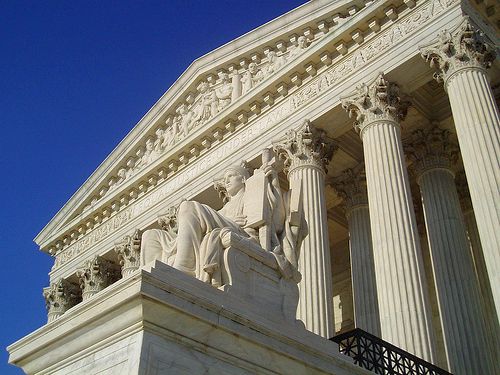The Major Questions Metadoctrine and The Slaughterhouse Cases
In my last post I show how US v. Cruikshank (1876) and The Slaughterhouse Cases (1873) affect our gun control crisis. In this post I look at the connection between The Slaughterhouse Cases and Biden v. Nebraska, the recent case striking down Biden’s student loan reduction plan.
The Slaughterhouse Cases
I discuss The Slaughterhouse Cases here. The Supreme Court could have decided them strictly on the basis of the police power. The appellant butchers argued that the untrammeled right to earn a living was a right protected by the Privileges or Immunities Clause of the 14th Amendment. That’s obviously not true. The Court later takes up the purposes of the Reconstruction Amendments, and there’s nothing to support the Appellants’ argument.
But Samuel Miller, who wrote the majority opinion, explains that he and the other members of the Court have thought it over, and “ we now propose to announce the judgments which we have formed in the construction of those articles, so far as we have found them necessary to the decision of the cases before us, and beyond that, we have neither the inclination nor the right to go.”
One of the advisory opinions that follow is that the Reconstruction Amendments were not intended to change the balance of powers between the federal and state governments. Miller justifies this by saying that if Congress wants to make an significant change the balance of powers between the states and the US, it has to do so in language acceptable to the Supreme Court.
Earlier in the opinion, MIller said that the Reconstruction Amendments were intended to insure that Black people had a full range of rights, just like White people. Section 5 gives Congress the power to enact laws to secure that right. So at the very least, the Reconstruction Amendments change the relations between state and US governments enough to permit the US to protect the rights of Black people. It’s hard to imagine clearer language, and Miller doesn’t even hint at one.
Furthermore, by the time of The Slaughterhouse Cases Congress had enacted two civil rights laws and three enforcement acts. This effectively is a declaration of Congress’ understanding of its power, and that of the President. Miller ignores the views of the other two branches. Only the opinion of five members of the Supreme Court counts. The Supreme Court is the unelected final authority in our democracy.
So, we have three points from The Slaughterhouse Cases:
1. If the Supreme Court majority wants to issue a ruling in a case, it will do so, regardless of precedents it might have established.
2. If Congress wants to accomplish a major change in our government it must figure out some language that even the Supreme Court is afraid to reject, but likely that’s impossible.
3. SCOTUS is supreme; it ignores the other two branches if it chooses.
Biden v. Nebraska
Majority Opinion. John Roberts’ majority opinion addresses the standing of the Appellants. Most of them don’t have standing, but no matter, because Roberts asserts that Missouri does and one is plenty. The basis for Missouri’s standing is that it had created MOHELA, an independent nonprofit governmental corporation, which owns and services student loans. MOHELA refused to participate in the lawsuit (I wonder why) but the Missouri AG claims that Missouri can sue in its place. He says MOHELA would lose an estimated $44 million in fees for loan servicing. None of that would ever go to Missouri, ever, but so what?
Roberts and the Fox News Six say MOHELA is an “instrumentality” of Missouri, the instrumentality might lose money which is an injury sufficient for standing, and that’s good enough. What he means is that standing is available because he wants to rule on the merits. Just like in The Slaughterhouse Cases.
In her dissent Elena Kagan explains that standing rules arise from the Constitutional requirement that SCOTUS only has jurisdiction of actual controversies. If a plaintiff isn’t injured, there is no standing.
It still contravenes a bedrock principle of standing law—that a plaintiff cannot ride on someone else’s injury. Missouri is doing just that in relying on injuries to the Missouri Higher Education Loan Authority (MOHELA), a legally and financially independent public corporation. And that means the Court, by deciding this case, exercises authority it does not have.
On the merits, Roberts addresses the statutory power granted to the executive branch to waive or modify any provision of the student loan program in the event of a national emergency. He explains that “waive” doesn’t mean waive, and that “modify” doesn’t mean modify, if the change is big. A lot of money is a big change. He doesn’t even hint at the words Congress should have used to get its way.
He says his opinion is supported by what he grandiosely calls the Major Questions Doctrine, because there’s a lot of money at stake. I call it the Major Questions Metadoctrine, or MQM, for reasons that will appear.
Barrett’s Concurrence. Amy Coney Barret, who clerked for the odious Antonin Scalia, styles herself a textualist. She wants us to know that the MQM is very good, so she writes a concurring opinion. Most of is is technical legal stuff about canons of interpretation. Two points are worth mentioning.
1. Barrett cites a 2010 law journal article by John f. Manning, a Harvard Law professor: Clear Statement Rules and the Constitution. You don’t have to read past the abstract to find out what Manning thinks:
This Essay argues that such clear statement rules rest on the mistaken premise that the Constitution contains freestanding values that can be meaningfully identified and enforced apart from the specific terms of the clauses from which the Court derives them.
Barrett ignores this point entirely. The MQM is supposed to be a clear statement rule. There are a number of these, mostly directed to structural constitutional issues like federalism. The Slaughterhouse Cases could be seen as an application of a clear statement rule, if it weren’t so obviously unnecessary and wrong.
In Biden v. Nebraska the MQM is applied to enforce Congressional control over the purse. But as Barrett herself shows, that isn’t in the Constitution. In her view, this purpose is an emanation from the Appropriations Clause. The power of the purse is a judicial trope, already once removed from the text of the Constitution. The MQM is a further step from the Constitution. Thus, a metadoctrine.
2. Barrett offers a hypothetical to explain her view.
Consider a parent who hires a babysitter to watch her young children over the weekend. As she walks out the door, the parent hands the babysitter her credit card and says: “Make sure the kids have fun.” Emboldened, the babysitter takes the kids on a road trip to an amusement park, where they spend two days on rollercoasters and one night in a hotel. Was the babysitter’s trip consistent with the parent’s instruction?
This is a laughable hypothetical. The Biden Administration didn’t just decide for funsies to reduce student debt. There was an economic catastrophe caused by a pandemic that killed a million Americans and sickened tens of millions.
The correct hypothetical is not a trip to a theme park, but a trip to the emergency room paid with the credit card.
This is shoddy work, but it’s all we an expect from rigid ideologues. It’s also an ugly parallel with the Reconstruction Era Supreme Court.
Conclusion
The parallels to The Slaughterhouse Cases are, I hope, obvious.
1. SCOTUS will ignore every restriction on its use of power if five members want to.
2. There is no statutory language clear enough if five (or more) members of SCOTUS don’t like the policy.
3. SCOTUS is very supreme.


